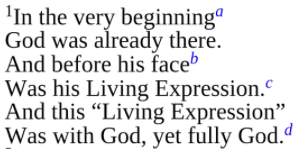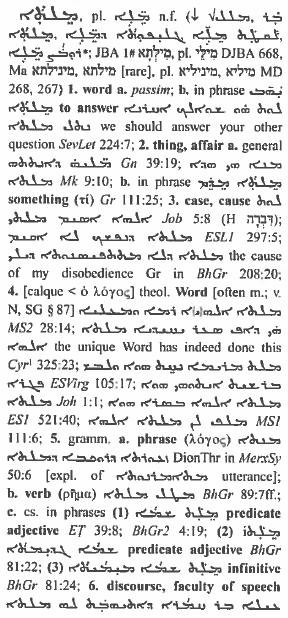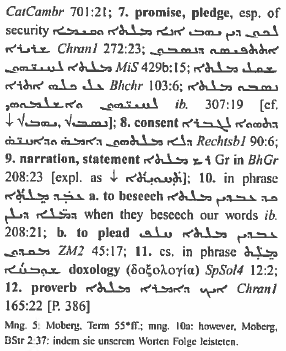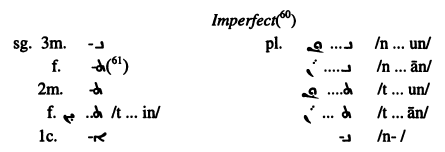John 1.1 reads:
Ἐν ἀρχῇ ἦν ὁ λόγος, καὶ ὁ λόγος ἦν πρὸς τὸν θεόν, καὶ θεὸς ἦν ὁ λόγος. (NA 28)
All thirty-six English versions at biblestudytools.com, including even ‘The Message’, translate λόγος with ‘word’. For example:
‘In the beginning was the Word, and the Word was with God, and the Word was God.’ (NASB)
Brian Simmons, however, has ‘Living Expression’ in place of ‘Word’:
(As an aside, the Holy Bible does not say in John 1.1 that God was already there in the beginning. What it says in the first clause is about the Word, not about God.)
At footnote ‘c’, which pertains to ‘Living Expression’ specifically, Simmons claims that this was translated from the Aramaic:
Once again, for the sake of focus, I will leave to one side the important question of why Simmons suddenly begins to translate from the Aramaic Peshitta rather than the Greek original, without any explanation. Again, I will limit myself to examining the veracity or otherwise of Simmons’ claim to be translating from the Aramaic text. The Peshitta text of John 1.1 reads:
ܒ݁ܪܹܫܝܼܬ݂ ܐܝܼܬ݂ܲܘܗ݈ܝ ܗ݈ܘܵܐ ܡܸܠܬ݂ܵܐ ܘܗܘܿ ܡܸܠܬ݂ܵܐ ܐܝܼܬ݂ܲܘܗ݈ܝ ܗ݈ܘܵܐ ܠܘܵܬ݂ ܐܲܠܵܗܵܐ ܘܲܐܠܵܗܵܐ ܐܝܼܬ݂ܲܘܗ݈ܝ ܗ݈ܘܵܐ ܗܘܿ ܡܸܠܬ݂ܵܐ
bərīšīṯ ᵓīṯaw wā melṯā wəhū melṯā ᵓīṯaw wā ləwāṯ ᵓălāhā wălāhā ᵓīṯaw wā hū melṯā
and it has been translated as:
‘In the beginning was the Word, [footnote: ‘Meltho’] and the Word himself was with Aloha, and Aloha was the Word himself.’ (Etheridge)
‘In the beginning, was the Word; and the Word was with God; and the Word was God.’ (Murdock)
‘The Word was in the beginning, and that very Word was with God, and God was that Word.’ (Lamsa)
and in the most recent scholarly translation by Childers and Prather as: 1
‘In the beginning was the word, and the word was with God, [footnote: ‘with God’ or ‘in the presence of God’ (the term can have either meaning; also in v. 2).] and the word was God.’
It will be seen that in all four versions, ܡܠܬܐ (melṯā) is translated as ‘the word’. Victor Alexander, however, as I pointed out in my last post, translated ܡܠܬܐ as ‘Manifestation’. Did he have any justification for doing so?
lexical definitions
The leading Syriac-English academic lexicon is that of Sokoloff and, since it is not online, I give his full entry for ܡܠܬܐ below:
It can be seen that the first meanings of ܡܠܬܐ are ‘word’, ‘thing, affair’, and ‘case, cause’. ‘Manifestation’ is not within its range of meaning. Why then did Alexander translate with this word?
In my last post, I told how Victor Alexander, according to his own account, obtained a copy of the New Testament in ancient Syriac, and began immediately to translate it, beginning with John’s Gospel. He would have found ܡܠܬܐ three times in John 1.1. Previously, he had been translating from a New Testament in Modern Syriac, which would have had the word ܗܡܙܡܢ
(hîmizmân) in place of ܡܠܬܐ, as can be seen in the left hand column, second and sixth words from right, of Perkins’ 1846 New Testament in Ancient and Modern Syriac at the first line of John 1.1:
In Maclean’s 1901 Modern Syriac Dictionary, the meaning of ܗܡܙܡܢ is given as ‘a word’, with a note to the effect that it stands for the Classical Syriac ܡܠܬܐ in signifying ‘the Word’: 2
Possibly Alexander didn’t know the old word ܡܠܬܐ, and simply invented a meaning for it that fitted his own theology.
trying to make it fit
He then tried valiantly to make this meaning fit in subsequent occurrences of ܡܠܬܐ. The Peshitta translators used the word very often to translate λόγος, and in many cases ‘manifestation’ does not give a coherent meaning. Difficulties begin to appear in the last clause of John 2.22:
καὶ ἐπίστευσαν τῇ γραφῇ καὶ τῷ λόγῳ ὃν εἶπεν ὁ Ἰησοῦς. [NA 28]
and they believed the Scripture and the word which Jesus had spoken. [NASB]
ܗ݈ܘܵܐ ܘܗܲܝܡܸܢܘ ܠܲܟ݂ܬ݂ܵܒ݂ܹܐ ܘܲܠܡܸܠܬ݂ܵܐ ܕܸ݁ܐܡܲܪ ܝܼܫܘܿܥ
[h]wā wəhaymen laḵṯāḇe walmelṯā demmar yešūᶜ
‘and they believed the scriptures, and the word which Jeshu had spoken.’ (Etheridge)
‘and they believed the scriptures, and the word that Jesus spake.’ (Murdock)
‘and they believed the scriptures and the word that Jesus had spoken.’ (Childers and Prather)
Alexander, however, has:
‘and they believed the Scriptures and the manifestation of which Eashoa spoke.’ (Alexander)
Just possibly, and at a stretch, His rising from the dead could be considered a ‘manifestation’ of who He is, but ‘word’ gives a much easier sense.
john 4.39-42
In John 4.39- 42, Alexander three times translates ܡܠܬܐ as ‘word’, but adds the meaning ‘manifestation’ in a footnote:
In John 4.39, Alexander radically alters the sentence, changing ‘because of the word of the woman’ to ‘because that woman believed his word’, without any justification. In John 4.42, it is hard to make any sense of the alternate rendering apparently given in the footnote. Why would the Samaritans believe in Jesus because of the ‘manifestation’ of the woman?
romans 9.9
ἐπαγγελίας γὰρ ὁ λόγος οὗτος· κατὰ τὸν καιρὸν τοῦτον ἐλεύσομαι καὶ ἔσται τῇ Σάρρᾳ υἱός. [NA 28]
‘For this is the word of promise: “At this time I will come, and Sarah shall have a son.”‘ [NASB]
ܕ݁ܡܘܿܠܟ݁ܵܢܵܐ ܓܹ݁ܝܪ ܐܝܼܬ݂ܹܝܗ ܡܸܠܬ݂ܵܐ ܗܵܕ݂ܹܐ ܕ݁ܲܒ݂ܙܲܒ݂ܢܵܐ ܗܵܢܵܐ ܐܹܬ݂ܹܐ ܘܢܹܗܘܹܐ ܒ݁ܪܵܐ ܠܣܲܪܵܐ
dəmūlkānā gēr ᵓīṯēh melṯā hāḏe daḇzaḇnā hānā ᵓīṯe wənehwe bərā ləsarrā
For the promise is this word, In this time I will come, and a son shall be unto Sara. (Etheridge)
For the word of promise was this: At that time will I come, and Sarah shall have a son. (Murdock)
Here the λόγος is not a single word, but a statement. This is well within the range of meaning of ܡܠܬܐ also (see definitions 5 and 9 in Sokoloff above), and is easily understandable in English too: the ‘word of promise’ refers to the following statement of promise.
There is nothing difficult about the syntax and meaning of this verse at all. Alexander, however, is so caught up by his notion that ܡܠܬܐ means ‘manifestation’ that he ‘translates’ the verse as:
‘For the Kingdom is this Manifestation that this Age should come to pass and Sarah would bear a son.’
One can only speculate as to how Alexander gets ‘Kingdom’ from the Syriac text rather than ‘promise’. The word is ܡܘܠܟܢܐ (mim-waw-lamadh-kaf-nun-alaf), which has a superficial similarity to ܡܠܟܘܬܐ (mim-lamadh-kaf-waw-taw-alaf), meaning ‘kingdom’, so it may be that he just decided to read one word rather than the other. The verb ܐܹܬ݂ܹܐ, which is normally translated ‘I shall come’, is Imperfect and has the alaf ending of the first person singular: 3
Alexander seems to render it as if it were a third person singular, with ‘this Age’ as the subject. I think this is impossible.
conclusion
Simmons claims that in John 1.1, ‘Living Expression’ is translated from the Aramaic text which, he says, can also mean ‘Manifestation’. Given that:
- ‘manifestation’ is not a lexical meaning of ܡܠܬܐ ; but
- Alexander translates the word as ‘Manifestation’; and
- Simmons is known to be dependent on Alexander for many of his claimed translations from Aramaic;
it is obvious that he has taken the meaning ‘manifestation’ from Alexander. He has then, I suppose, presumed further that if the Aramaic can mean ‘manifestation’, then it can also mean ‘expression’. The ‘living’ I take to be an additional flourish. The possessive ‘his’ is added, I think, to give a better sense, despite it being absent from both the Greek and the Hebrew.
With respect to Brian Simmons, who I think means well, this is not translation at all.
Andrew








